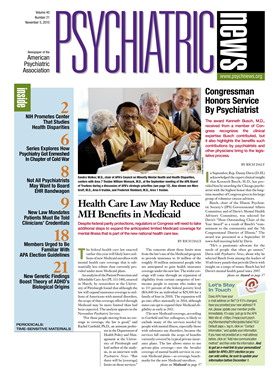Although many people think that depression is solely an affliction of the mind or brain, this is not so, Thomas Ungar, M.D., an associate professor of psychiatry at the University of Toronto, said at the annual meeting of the Canadian Psychiatric Association in Toronto in September, during a session exploring the mind-body connection in depression.
Also at the meeting, Vladimir Maletic, M.D., a clinical professor of neuropsychiatry at the University of South Carolina, cited evidence underscoring the point.
For example, Maletic cited “an amazing 32-year-long study that took place in New Zealand.” Subjects who had been socioeconomically disadvantaged, maltreated, or socially isolated as infants or children were significantly more likely, at age 32, to be not just depressed, but to have immune abnormalities and metabolic abnormalities—high blood pressure or high total cholesterol, for example—than subjects who had been spared such adversities as infants or children. “This finding suggests that some of the psychological and physiological pathways that underlie major depressive disorder also underlie many physical illnesses,” he said.
At the same time, Maletic pointed out, depression brings about physiological changes that can increase the risk of heart disease, asthma, or other illnesses. For instance, major depressive disorder can alter the volume of the hippocampus, which in turn is involved not just in memory processing, but in neuroendocrine function. In addition, the illness can lead to autonomic and immune dysregulation and biorhythm disturbances, even an increase in body temperature. Inflammatory cytokine levels may correlate with symptom severity in major depressive disorder.
Genes that influence people's susceptibility to depression may also influence their susceptibility to physical illnesses, Maletic pointed out. For instance, the serotonin transporter gene is known to influence depression risk, and a study is being conducted to see whether it also influences people's inflammatory response to stress.
Depression is a highly complex, chronic disorder, and is particularly so for people who are being stressed, Andrew Nierenberg, M.D., a professor of psychiatry at Harvard Medical School, emphasized at the session. This may explain why “our treatments for the disorder may not work as well as we would like.”
However, antidepressants often do help, he said, and the reason may be not just because they act on serotonin, but because they increase levels of brain derived neurotrophic factor (BDNF), which in turn may protect neurons from the deleterious effects of stress. But whether an increase in BDNF is more critical than an increase in serotonin for countering depression remains to be determined, Nierenberg said.

